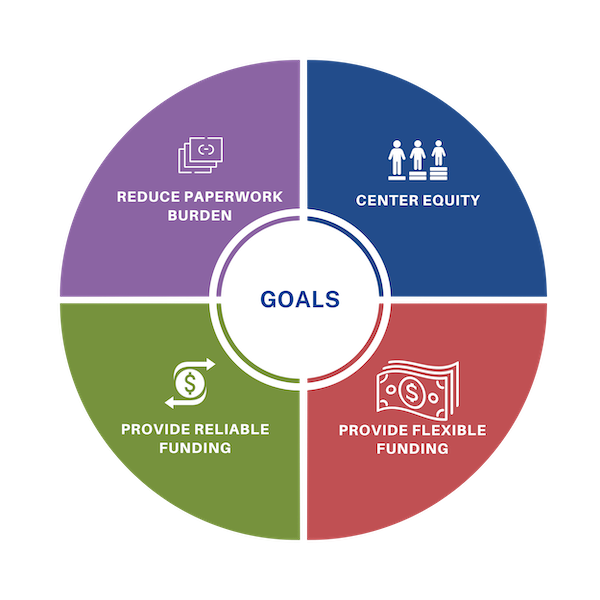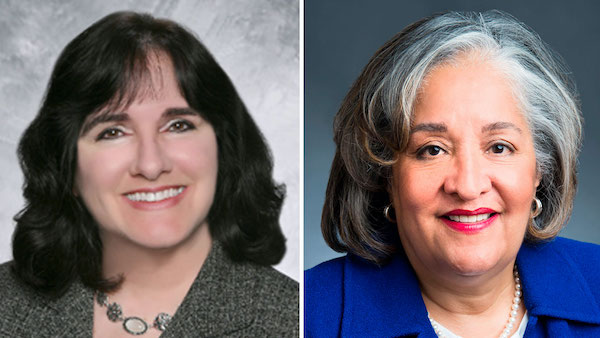Site Search
- resource provided by the Forum Network Knowledgebase.
Search Tip: Search with " " to find exact matches.

Deepening Philanthropic and Nonprofit Partnerships in New Jersey
Doing Good Better, a partnership of the Council for New Jersey Grantmakers and the New Jersey Center for Nonprofits, is a community of funders and nonprofits taking action against the power imbalances and racial inequities in philanthropy, nonprofits and government. Accessible, equitable, and mutually accountable relationships are primary and indisputable building blocks for a stronger society and thriving communities. Our goal is to shift the culture of the New Jersey philanthropic and nonprofit ecosystem by encouraging funders, nonprofits, and government to create shared power rooted in collaboration, mutual trust, and respect.
Doing Good Better Goals: A Framework for Change
The Doing Good Better Steering Committee encourages funders to focus on and advocate for four changes that can make an immediate difference in addressing power dynamics between nonprofits and funders and maximizing nonprofit impact.
Why now?
For many years, but particularly in the context of the COVID-19 pandemic, natural disasters, and the heightened outcry for racial equity and social justice, funders have been urged to embrace more flexibility and transparency in their grantmaking. Practices such as general operating support, simplified application and reporting procedures, multi-year funding and others have been shown to level the power imbalance, advance greater equity, strengthen partnerships between funders and their nonprofit partners, and thereby improve community impact.
Many grantmakers temporarily embraced flexible practices in the wake of Superstorm Sandy and during the height of the pandemic, and these structural changes empowered nonprofits to become more resilient and have a greater impact in their communities. But while some funders have retained the flexible practices, others have reinstated previous restrictions.
In New Jersey and across the country, there is a renewed urgency to NOT return to business as usual. It’s long past time.
Doing Good Better invites all of us to reflect on how power is distributed in our partnerships, learn from our peers, and make adjustments that position all community partners for transformative, equitable change in New Jersey.
How?
Guided and informed by 50+ advisors from New Jersey who represent a broad range of perspectives from nonprofits, philanthropy, and beyond, we are approaching this work through the lens of systems change – the recognition that transformative change can only occur after power structures have been addressed collectively. Specifically, Doing Good Better encourages funders to consider the power dynamics that underpin their policies, practices, and resource flows. To do this, we provide resources and a space for dialogue centered on changes in key practices and culture shifts.
Quick practice changes you can make now.
The road to systems change begins with changing practices that impede nonprofits’ pursuit of their missions, and implement practices that demonstrate respect for and trust in the expertise and experience of nonprofits and the communities they serve. Several key practices have consistently been shown to be particularly effective. Many of these have been requested by nonprofits for quite some time, and are reflected in the principles of Trust-Based Philanthropy and Community-Centric Fundraising, among others. Here are a few practice changes you can make now:
Type of Funding
● Give multiyear and unrestricted funding, especially for grantee partners with which you’ve had long term relationships.
Access to Funding
● Create alternative processes for organizations too small to submit audits to reduce barriers to obtaining grants.
● Set aside funding pools for BIPOC-led organizations that may not have access to traditional funding sources.
Simplifying the Process
● Simplify and streamline application and reporting processes.
● Eliminate annual requests for organizational information that does not change from year to year.
Learning
● Engage with the community through participatory grantmaking that aligns with the community’s goals.
● Open dialogues with nonprofits by soliciting and acting on feedback
How do we know?
We’ve asked the experts: nonprofits, foundations, and community members who are working directly in our community as well as peers from across the country who are eliminating power imbalances in their own communities.
● Feedback from over 50+ Advisors
● The Council of New Jersey Grantmakers survey
● The Center for New Jersey Nonprofit’s survey
● The Trust Based Philanthropy Project
● The Community-Centric Fundraising movement
● Thought leaders and advocates throughout the nonprofit community
● Case studies from across the US
This advocacy and civic engagement toolkit is designed for community and public foundations that want to educate and encourage their grantees about getting involved in civic and policy activities to increase organizational capacity and impact. While its primary focus is on the grantmaking activity of these foundations, the toolkit also addresses rules and guidance for policy involvement by foundation officials acting on behalf of their foundations.
This weekly conference call series welcomed New Jersey-based grantmakers along with national funders and provided an opportunity for grantmakers to hear from a wide range of experts in the field of disaster philanthropy. Series 1 started on November 5, 2012, one week after Sandy struck New Jersey, and continued through March 25, 2013. Series 2 started on September 9, 2013 and concluded on November 4, 2013. The written compendium of the recordings is listed below.
Joint Statement from CNJG and the Center for Non-Profits
This statement also appeared on NJ Spotlight.
A conversation between two customers in line at a New Jersey supermarket turned ugly when one man denigrated the other with a racial slur and blamed the fellow shopper for the coronavirus pandemic.
With so much else going on these days, it would be so easy to react to such a seemingly minor incident by saying, oh well, these things happen. Times are tough; tempers are short.
But shrugging our shoulders is not an option. Doing so is complicity in a wrongful acts that too often are repeated, over and over. Our silence merely emboldens those who would tear apart the fabric of our society, whether through hate or ignorance – or the extremely volatile mix of the two.
It’s not difficult to connect the dots between “little” incidents and the systemic racism that leads to tragedies like the killing of George Floyd in Minneapolis. When we ignore or accept any examples of people being demeaned over what they look like or where they (or their ancestors) came from, we only open the door for massive abuses and the wrenching reckoning that follows them.
We mustn’t be cowed by fear of being seen as overly sensitive or labeled “politically correct.” This is about being morally and ethically correct in the face of bias and hatred – and that shouldn’t be too much to ask of Americans, regardless of their political party or ideology.
As state Attorney General Gurbir Grewal said recently, “COVID-19 is no excuse for racism, xenophobia, or hate. Discrimination and harassment in violation of New Jersey law remains illegal even if it occurs against the backdrop of a global pandemic." It’s gratifying to live in a state where the top law enforcement officer speaks out this way.
Unfortunately, it also is a state where reported hate crimes are up in recent years. We can’t tolerate such behavior, whether by police, elected officials or “average people.” There is too much at stake for bias to become the new normal.
As the leaders of the major philanthropic and non-profit membership organizations in New Jersey, representing both the wide range of non-profit groups and the multi-faceted funders of those groups, we feel compelled to speak out against the hateful responses we and our members have witnessed in reaction to the COVID-19 Pandemic.
Our country has seen countless examples of selfless sacrifice and good works over the past weeks, both on individual and institutional levels. We are proud that the members our organizations have been leaders in responding to the needs of our community.
But to our distress, some individuals are using the pandemic to put forward their bias and hatred toward their fellow citizens.
Times of crisis bring to the surface, on the part of some people, the need to scapegoat. Often, this takes the form of lashing out at particular groups, stirred up by inflamed rhetoric or more subtle code words or phrases, having no relationship to facts. In this time, there have been verbal and physical attacks against people of Asian and Pacific Islander background, as there were against Muslims after September 11 and against African-Americans and Latinos in countless other instances. This hatred and these attacks must stop.
The non-profit sector is the backbone of our communities, providing assistance and education to a wide range of people, in good times and especially in challenging times. Many of these services are a lifeline to people of all backgrounds, religions, ethnicities and statuses in life.
Non-profit organizations are the vehicle through which people can work together to selflessly assist others. People around the world view the United States as being unique in the breadth and depth of its charitable and philanthropic work, engaging the talents of all individuals, regardless of their economic or social status.
We call upon all people of good conscience in their good work to be alert for hateful words and actions and – always -- to speak out against them, both as individuals and as organizations.
Our language and our actions do matter.
Everyone, and especially people in positions of public trust or prominence, has the obligation to use our works and our lives to assist all in need and to honor the dignity and potential of all those we meet.
We call on not only our own members, but everyone who serves and volunteers in our sector to join us in this effort to speak out against racism and hatred and to exemplify all the best that we know our country is.
Maria Vizcarrondo
CNJG CEO and President
Linda Czipo
Center for Non-Profits CEO and President
William V. Engel
CNJG Board Chair
Gina M. Plotino
Center for Non-Profits Board Chair
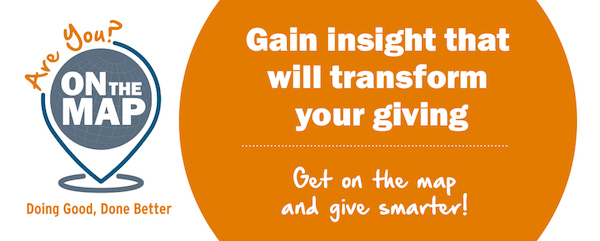
Get on the map and give smarter
Get on the Map is an exciting data-sharing initiative designed to dramatically improve the quality and availability of giving data for our region. Using this tool to put your grantmaking in context will provide valuable insights that can transform your giving.
Knowing how other foundations or corporations are funding in a certain geographic area or with a specific nonprofit can make everyone’s work more effective.
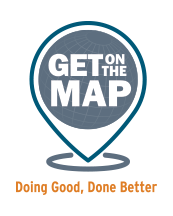 Imagine real-time answers to questions like:
Imagine real-time answers to questions like:
- How are others serving at-risk youth?
- Are organizations in our region receiving enough capacity building support?
- Who else funds economic development in our rural communities?
Through a partnership with Candid (formerly the Foundation Center) and the United Philanthropy Forum, Get on the Map enables CNJG members to see the scope of their grantmaking, find natural funding partners, and gain deeper understanding of New Jersey’s philanthropic landscape.
Watch the short video below to learn how easy it is to Get on the Map!
It starts with sharing your giving data
Your data will power valuable resources for your organization and our region, including access to the CNJG Foundation Funding Map, a special interactive searchable mapping platform, engineered by Candid.
When you share your data, you control your story. No one knows your grantmaking better than you. Tell your story, your way is good for the sector because better information benefits everyone. Join the community of funders sharing their data to ensure the field is acting on the best possible information. Share Now!
Self-Paced Training for Funders on Using Candid
Candid has also launched a new, free self-paced course for funders: Funding Smarter: Using Candid Tools to Inform and Share Your Foundation’s Work. The course is meant to help funders use Candid’s mapping, data, and knowledge tools to better identify funding peers, potential grantee partners, identify funding connections and gaps, and learn from knowledge other funders have already shared. It also highlights the value of sharing data with Candid.
President Obama's Hurricane Sandy Task Force released this rebuilding strategy to serve as a model for communities across the nation facing greater risks from extreme weather and to continue helping the Sandy-affected region rebuild. The Rebuilding Strategy contains 69 policy recommendations, many of which have already been adopted, that will help homeowners stay in and repair their homes, strengthen small businesses and revitalize local economies and ensure entire communities are better able to withstand and recover from future storms.
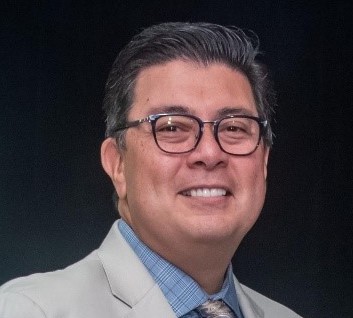
New Jersey’s philanthropic community mourns the loss of Jeffery Vega, who passed away January 28.
Jeff joined CNJG’s Board in 2016, and during his tenure served as First Vice Chair and Board Chair, and participated on multiple committees, affinity groups, and co-chaired the Trenton Area and Mercer County Funders affinity group. Jeff shaped and cultivated the direction and focus of CNJG through his supportive and proactive leadership. His direction and guidance during the pandemic helped CNJG not only stay the course, but continue to grow and thrive.
“Working with Jeff was a joy and a privilege,” CNJG President and CEO Theresa Jacks said. “Jeff guided us through the pandemic, a leadership transition, a strategic planning process, the approval of equity principles, and CNJG’s first-ever policy agenda with a steady hand, fierce commitment to equity, unwavering dedication to the membership, and the perfect combination of visionary thinking, wisdom, and kindness.”
His CNJG legacy includes the 2023 Strategic Plan, the creation of the Racial Equity Committee, CNJG’s first policy agenda, the New Jersey Principles for Philanthropy, and leading a dynamic and diverse board.
Jeff was the President and CEO of Princeton Area Community Foundation since 2015. Before joining PACF, Jeff was President of New Brunswick Tomorrow.
You can read more at the Princeton Area Community Foundation’s tribute page and announcement of Jeff’s passing.
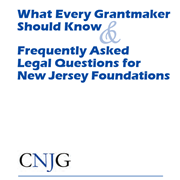
This guide was designed to help the state’s philanthropic community understand their ethical, legal, and fiduciary requirements and obligations.

Retributing Power by Simplifying and Streamlining Processes
Sisters of St. Joseph Health & Wellness Foundation
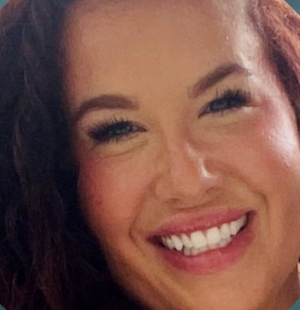 When Beth Collins joined the Sisters of St. Joseph Health and Wellness Foundation as the new Executive Director, she knew that the foundation could be doing more to support its nonprofit ecosystem. With a background in direct service, Beth remembered when she was on the other side of the funding relationship – sometimes spending hours writing lengthy application materials or digging up data to meet reporting requirements, all while juggling her never-ending to-do list. By aligning the values of Trust-Based Philanthropy to the virtues and mission of the Sisters of St. Joseph, she has catalyzed a shift toward redistributing power in its community partnerships.
When Beth Collins joined the Sisters of St. Joseph Health and Wellness Foundation as the new Executive Director, she knew that the foundation could be doing more to support its nonprofit ecosystem. With a background in direct service, Beth remembered when she was on the other side of the funding relationship – sometimes spending hours writing lengthy application materials or digging up data to meet reporting requirements, all while juggling her never-ending to-do list. By aligning the values of Trust-Based Philanthropy to the virtues and mission of the Sisters of St. Joseph, she has catalyzed a shift toward redistributing power in its community partnerships.
This power shift began when Beth started a conversation about values with the foundation board. By approaching the board with curiosity and bringing the voice of the community into the conversation, she set the tone for trust, openness, and an ongoing dialogue. The Foundation is now working toward fully embodying its values in its practices. The Sisters of St. Joseph have expanded their general operating support portfolio, shifted the bulk of the application process from applicants to the Foundation, replaced written reports with honest conversations, and created more opportunities for the public to provide feedback and engage in candid dialogue with the board. Focusing on only the essential information for applications and reporting has enabled staff to redirect their time and energy to develop wholehearted relationships with community partners. By starting with the why, Beth is leading the Foundation toward a clear vision for the how: “Trust Based Philanthropy is about humility – at Sisters of St. Joseph, we recognize that we are just one piece of the puzzle – and we are encouraging others to think outside of themselves.”
Offering Support Beyond the Check
Liberty Hill Foundation
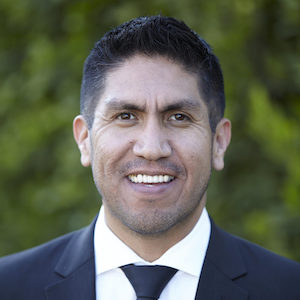 A community-funded foundation since day 1, Trust Based Philanthropy is at the core of the Liberty Hill Foundation. Centered on social justice campaigns, research, and policy initiatives designed to drive systemic change, Liberty Hill Foundation refers to itself as a "Laboratory for Social Change Philanthropy”. When Julio Marcial stepped into the role of Senior Vice President of Programs, he looked beyond the funding and considered the myriad of ways the foundation can support community partners beyond the check by connecting them to other funders and donors. As a member of several pooled funds in Los Angeles, Liberty Hill Foundation proactively seeks opportunities that will benefit their community partners. The Foundation has introduced many funders in their circle to Trust Based Philanthropy principles – this has sparked several conversations at other foundations serving Los Angeles county, several of which have since shifted their practices. Beyond private and public foundations, Marcial advocates for a push to Trust Based Philanthropy in California state funding agencies.
A community-funded foundation since day 1, Trust Based Philanthropy is at the core of the Liberty Hill Foundation. Centered on social justice campaigns, research, and policy initiatives designed to drive systemic change, Liberty Hill Foundation refers to itself as a "Laboratory for Social Change Philanthropy”. When Julio Marcial stepped into the role of Senior Vice President of Programs, he looked beyond the funding and considered the myriad of ways the foundation can support community partners beyond the check by connecting them to other funders and donors. As a member of several pooled funds in Los Angeles, Liberty Hill Foundation proactively seeks opportunities that will benefit their community partners. The Foundation has introduced many funders in their circle to Trust Based Philanthropy principles – this has sparked several conversations at other foundations serving Los Angeles county, several of which have since shifted their practices. Beyond private and public foundations, Marcial advocates for a push to Trust Based Philanthropy in California state funding agencies.
The Liberty Hill Foundation embraces itself as a fundraiser for its nonprofit partners and its responsibility for the Los Angeles community. The Foundation raises the funds and opens doors for nonprofits and then “steps out of the way,” says Julio. According to Julio, partnerships are the key to maximizing trust and impact in the community: “We can't do this without our partners, peers, and donors. We need to call each other out – and to call each other in.”
Leading with Trust, Transparency, and Responsiveness
Headwaters Foundation
 Headwaters Foundation is a health-conversion foundation working side by side with the community to achieve better outcomes towards a healthy and thriving Western Montana. Brenda Solorzano, CEO of Headwaters, has been at the helm of the foundation since its inception in 2017. With over 20 years of experience in traditional philanthropy, Brenda began asking big questions about standard philanthropic practices. Brenda is especially focused on tapping into the collective knowledge and experience of the community to create impactful systems. Early on in her tenure as CEO, Brenda shared her vision for Trust Based Philanthropy with the foundation’s board and they have supported her as she’s stewarded the foundation through its strategic planning process.
Headwaters Foundation is a health-conversion foundation working side by side with the community to achieve better outcomes towards a healthy and thriving Western Montana. Brenda Solorzano, CEO of Headwaters, has been at the helm of the foundation since its inception in 2017. With over 20 years of experience in traditional philanthropy, Brenda began asking big questions about standard philanthropic practices. Brenda is especially focused on tapping into the collective knowledge and experience of the community to create impactful systems. Early on in her tenure as CEO, Brenda shared her vision for Trust Based Philanthropy with the foundation’s board and they have supported her as she’s stewarded the foundation through its strategic planning process.
Community input and feedback was important to Brenda. With the board’s support, she took this a step further by engaging the community as co-creators and decision-makers. To accomplish this, Brenda invited 600 nonprofit representatives across the state to the table to share their thoughts. Brenda asked each person 2 questions: “If you were in my seat, what do you think the foundation should prioritize?” and “What’s the biggest challenge in your work?” By creating a space for open dialogue, Brenda took the pulse of the real challenges in Western Montana communities.
Soon after her introduction to Western Montana’s nonprofit sector, Brenda called on the community again to help design the foundation’s strategic focus. She hosted a series of public community meetings in each of Montana’s 15 counties. Headwaters facilitated a design-thinking process for members to discuss their challenges and co-create solutions. Two key strategies emerged: upstream systems and social change determinants prioritizing children and Indigenous populations.
Brenda engaged the community as decision-makers as Headwaters explored partner organizations for the foundation’s child thriving portfolio. The community nominated and voted on non-profit partners in a live meeting. This was a new approach and even some staff were nervous about the outcome. Headwaters proudly reports that a few years later, many of the organizations selected have grown to become blossoming collaborations. Grounded in Trust-Based principles since its inception, Headwaters is an exemplar of what it means to Do Good Better. Brenda says, “Trust Based Philanthropy is about starting from a place of trust.”
Co-Creating Goals by Soliciting and Acting on Feedback
T. Rowe Price Foundation
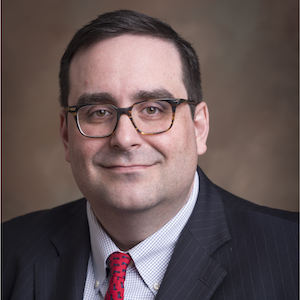 When John Brothers joined T. Rowe Price Foundation as President in 2015, the Foundation’s home in Baltimore was in the midst of social unrest following the tragic murder of Freddie Gray, a 25-year old Black man arrested over his legal possession of a knife and sustained injuries while being transported by the Baltimore Police. The T. Rowe Price Foundation recognized that it was a critical time to pause and listen to the Baltimore community. Within months of joining the Foundation, John Brothers and the Foundation team began an ongoing dialogue within Baltimore – in homes, places of worship, and community spaces. By leaning into the expertise and experience of community partners, John developed the T. Rowe Price’s Theory of Philanthropy, which mirrors principles to those similar to Trust-Based Philanthropy.
When John Brothers joined T. Rowe Price Foundation as President in 2015, the Foundation’s home in Baltimore was in the midst of social unrest following the tragic murder of Freddie Gray, a 25-year old Black man arrested over his legal possession of a knife and sustained injuries while being transported by the Baltimore Police. The T. Rowe Price Foundation recognized that it was a critical time to pause and listen to the Baltimore community. Within months of joining the Foundation, John Brothers and the Foundation team began an ongoing dialogue within Baltimore – in homes, places of worship, and community spaces. By leaning into the expertise and experience of community partners, John developed the T. Rowe Price’s Theory of Philanthropy, which mirrors principles to those similar to Trust-Based Philanthropy.
T. Rowe Price’s Theory of Philanthropy centers long-term impact by strategic investments in areas identified in partnership by those who live and work within the Baltimore community. The Foundation and community partners co-define a vision for success and community partners are trusted with the agency to make decisions in pursuit of shared goals. T. Rowe Price’s Theory of Philanthropy is considered a distinct model among other large corporate foundations. When asked how John managed to gain board consensus on this novel approach, he characterized the Theory of Philanthropy with a business metaphor: “People don’t buy stocks for an iPhone – they invest in Apple.” The Foundation focuses on supporting nonprofit organizations in a holistic way. By listening to the community early on, John shifted the Foundation’s approach from funding a variety of important, yet disconnected, programs to a co-creating strategic investment of capital and other support on more focused efforts that will have a lasting impact. To learn more please visit troweprice.com/foundation.
Doing Good Better, a partnership of the Council of New Jersey Grantmakers and the New Jersey Center for Nonprofits, is a community of funders and nonprofits taking action against the power imbalances and racial inequities in philanthropy, nonprofits, and government.
Culture Workers often face inconsistent income and undervaluation of their work. Traditional budgeting models leave many without (or lack adequate support of) fair compensation using the belief that mission-motivation and passion for the work replaces the need for competitive salaries. The Solidarity Economy is an innovative and inclusive economic framework that prioritizes social justice, environmental sustainability, and community well-being. Join us for a compelling conversation about funding practices that use a solidarity-based approach and find out what New Jersey funders are learning about local compensation trends from the ArtsPay NJ report. Together we will explore ways to advocate and take action around worker pay equity and beyond.
Panelists:
John McEwen, Executive Director – New Jersey Theatre Alliance
Erica Nagel, Deputy Director – New Jersey Theatre Alliance
Eddie Torres, President & CEO – Grantmakers in the Arts
Moderator:
Diane Felcyn, Program Officer – New Jersey State Council on the Arts
Webinar Video
Resources
Solidarity Not Charity: Arts & Culture Grantmaking in the Solidarity Economy - Grantmakers in the Arts
Solidarity Economy Resources - Grantmakers in the Arts
Grants to Worker Cooperatives & Small Businesses — The Reader - Grantmakers in the Arts
Grantmakers’ Changes in Practice 2023 — The Reader - Grantmakers in the Arts
Support for Individual Artists’ Committee - Grantmakers in the Arts
ArtsPay NJ - New Jersey Theatre Alliance
ArtsPay NJ - Information, Reports, and Dashboard
ArtsPay NJ - Interactive Dashboard
ArtsPay NJ - Full Report
ArtsPay NJ - Summary Report
Webinars
Upcoming: Wednesday, October 23
Move the Money: Nuts & Bolts: Making Grants to Cooperatively Owned Small Businesses
Previous
Move the Money: Grantmakers in the Arts & Art.Coop Solidarity Economy Discussion Series
Move the Money Series: Guaranteed Income
Move the Money: The Richness of Southern Soils: Supporting Black Farming and Food
New Jersey Organizations and Resources
- American Red Cross – Chapters covering the State of New Jersey
- State of New Jersey Catholic Charities - Diocese of Camden - Diocese of Trenton
- Community Emergency Response Teams provides opportunity for citizen volunteers to be involved in emergency management activities.
- Community Food Bank of New Jersey
- Goodwill NY NJ
- Jersey Cares recruits and engages volunteers in efforts that address community-identified needs.
- NJ 2-1-1 helps people find solutions to personal needs by informing them of resources in their community.
- NJ Department of Human Services: Disasters & Emergencies - Help & Information
- Pass It Along, an affiliate of the Hands on Network, recruits and engages volunteers.
- The Salvation Army - New Jersey Division
- Volunteer Center of Bergen County, Inc.
- Volunteer Lawyer’s for Justice - Provides legal support to New Jersey residents.
- United Way of Greater Philadelphia and Southern New Jersey
Nationwide Organizations and Resources
- American Institute for Conservation—Collections Emergency Response Team (AIC-CERT)
Offers free emergency response assistance to cultural organizations with collections. AIC-CERT is supported and managed by the Foundation of the American Institute for Conservation (FAIC) and consists of a force of 107 “rapid responders” trained to assess damage and initiate salvage of cultural collections after a disaster has occurred. - American Red Cross - Disaster Recovery Guides
- BBB Wise Giving Alliance
The BBB Wise Giving Alliance helps donors make informed giving decisions and advances high standards of conduct among organizations that solicit contributions from the public. - Center for Disaster Philanthropy
The when, where, and how of informed disaster giving - Center for International Disaster Information (CIDI)
Provides individuals, groups, embassies and corporations with information and guidance in support of appropriate international disaster relief efforts. - CERF+ Artists’ Relief Exchange along with its partners in the National Coalition for Arts Preparedness and Emergency Response are committed to providing and connected people to emergency relief.
- FEMA
Information from the Federal Emergency Management Agency - FEMA Geo Portal
This portal provides geospatial data and analytics in support of emergency management - FEMA - National Disaster Recovery Framework
This guide provides a flexible structure that enables disaster recovery managers to operate in a unified and collaborative manner to provide effective recovery support to disaster-impacted jurisdictions. - Guide to Navigating FEMA and SBA Disaster Aid for Cultural Institutions
- The Tsunami Learning Project: Lessons for Grantmakers in Natural Disaster Response
This guide, published by Grantmakers Without Borders, offers new tools for grantmakers when responding to natural disasters. - IRS Disaster Relief Resources for Charities and Contributors
In the aftermath of a disaster or in other emergency hardship situations, individuals, employers and corporations often are interested in providing assistance to victims through a charitable organization. The IRS provides a number of resources to help those involved in providing disaster relief through charities. - Disaster Relief, Providing Assistance Through Charitable Organizations
IRS Publication 3833 describes how members of the public can use charitable organizations to provide assistance to victims of disasters or other emergency hardship situations. - Emergency Drying Procedures for Water Damaged Collections
A guide from the Library of Congress - Preparation & Response for Cultural Institutions
A guide from the National Trust for Historical Preservation. - Small Business Administration
Learn about and apply for SBA Disaster Loans for business of all sizes – private and nonprofit
Tax Exempt Organization Search helps users find information about a tax-exempt organization’s federal tax status and filings. You can find:
- Organizations eligible to receive tax-deductible charitable contributions (Pub 78 data).
- Automatically revoked organizations
- IRS determination letters dated on or after January 1, 2014
- Form 990-series returns
- Organizations that have filed a Form 990-N (e-Postcard)
One year from now the 2020 Census will be in full swing. This nationwide, constitutionally-mandated count, conducted once every ten years, is our opportunity to ensure that New Jersey residents are accurately counted to secure the resources needed to support our communities. Nationally, more than $800 billion in federal funding as well as fair, proportional voting representation are at stake. In New Jersey, allocations from 16 federal programs including Medicaid, education grants, and even highway planning and construction are allotted based on the census count. This totaled over $17 billion in 2015.
But the 2020 Census is facing unprecedented challenges, including years of underfunding, a climate of fear, the challenges of the first “high tech” census, and the potential addition of an untested citizenship question. That means we will all have to work together to overcome these challenges and help achieve a fair and accurate census to ensure that the hardest-to-count communities—like people of color, low-income folks, LGBTQ people, immigrant communities, rural communities, and young children—aren’t missed. Based on the latest census estimates, approximately 22% of New Jersey’s population lives in hard-to-count areas.
CNJG joins the Funders’ Committee for Civic Participation’s Funders Census Initiative, United Philanthropy Forum and philanthropy-serving organizations around the country in asking our members to commit to supporting and encouraging a fair and accurate census.
The Census is one of our nation’s most important and consequential civic obligations. Getting it right and counting everyone ensures people and communities can thrive.
Please feel free to reach out to me or Deputy Director Theresa Jacks for information about the Council’s work on behalf of a full, fair and accurate 2020 Census.
Sincerely,
Maria Vizcarrondo, President and CEO
Council of New Jersey Grantmakers
This resource guide includes various virtual volunteer opportunities, additional resources, and best practices for corporate volunteer programs during the coronavirus pandemic.
This resource will be updated, as CNJG and corporate members collect new information and opportunities to share with colleagues.
Native Voices Rising is a joint research and re-granting project of Native Americans in Philanthropy and Common Counsel Foundation. This report focuses on the practices and challenges of community organizing and advocacy, focusing on the need for increased investment in and sustained support for American Indian, Alaska Native and Native Hawaiian communities.
This weekly conference call series welcomed New Jersey-based grantmakers along with national funders and provided an opportunity for grantmakers to hear from a wide range of experts in the field of disaster philanthropy. This series started on September 9, 2013 and concluded on November 4, 2013. The written summaries of each recording are listed below.

